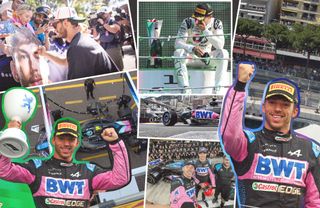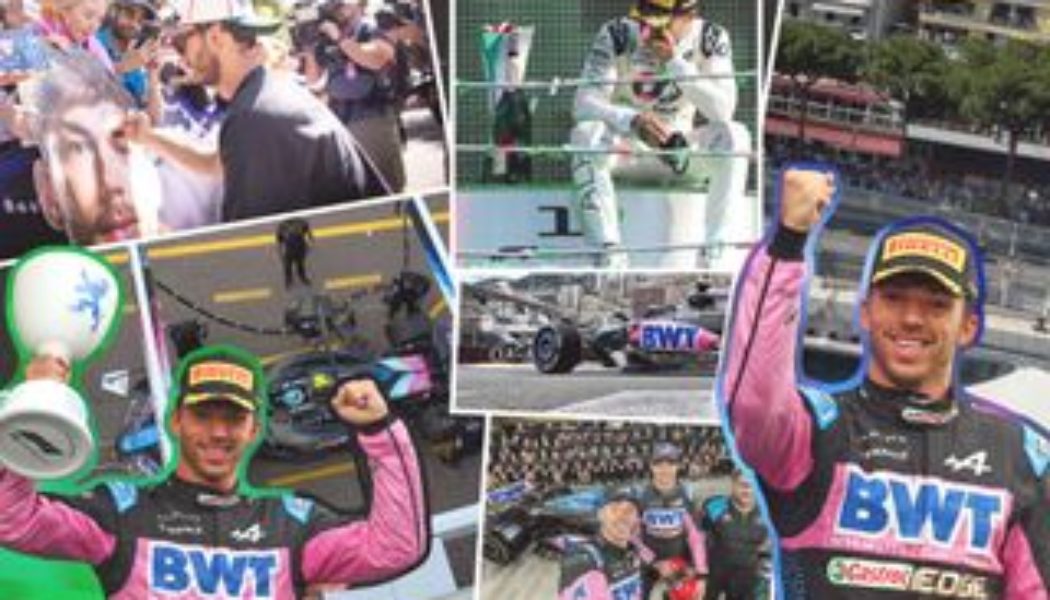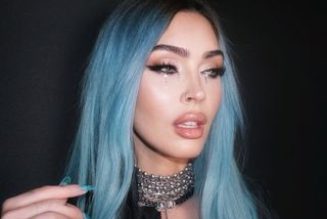Some of us have to wait decades to figure out what it is that we want to do with our lives, but Pierre Gasly was just 6 years old when he discovered his dream. “The first time I jumped into a go-kart, I was like, This is just my life,” the 28-year-old French Formula One driver told me from the BWT Alpine F1 Team’s hospitality unit at the Monaco Grand Prix. “I want to become a Formula One driver.”
Born in Rouen, the capital of Normandy, to a racing family—his father, Jean Jacques Gasly, participated in karting, endurance racing, and rallying, while both of his paternal grandparents were karters, his grandmother a champion—Gasly grew up watching other people drive. But it wasn’t until he put his foot on a gas pedal that everything clicked. “The feeling of driving and speed and being that close to the floor,” he said, trailing off slightly as if lost in an early memory. “From 6 years old, I was just obsessed with racing.”
According to Gasly, in the beginning, F1 starts as nothing but a dream. “So you’re just pursuing your dream,” he explained. “And then there are stages of your career where you think, Okay, I can turn this dream into a reality if all the pieces fall in the right place.” Twenty thirteen marked one of those stages. Gasly was 17 and had been racing in various categories for 11 years when he won the European championship in Formula Renault 2.0, securing him a spot in Red Bull Racing’s lauded Driver Academy. (Four-time F1 World Champion Sebastian Vettel, three-time champion Max Verstappen, and eight-time Grand Prix winner Daniel Ricciardo also came up through the program). “I knew then that if I do my side of the job well,” Gasly said, “they will give me the opportunity in Formula One.”
It was a realization of my dream.
Pierre Gasly
In 2017, after years of sacrifice, hard work, and the stars aligning, that’s exactly what happened. Mid-season, Gasly replaced Daniil Kvyat at Red Bull Racing’s second team, Toro Rosso (now Visa Cash App RB F1 Team), giving him his first taste of the big leagues. The following year, he signed a full-season contract with the team for 2018. “It was a realization of my dream,” Gasly said.
It’s only been seven years since Gasly made his F1 debut, but a lot has changed, for him as a person, yes, but also for the sport as a whole. According to him, F1 always had a strong motorsport fan base, especially in Europe. But in 2019, the same year that Gasly replaced Ricciardo at Red Bull’s top team, Netflix released the first season of Formula One: Drive to Survive, a docuseries that gave F1 fans and novices alike a behind-the-scenes look inside the paddock, an otherwise extremely secretive and exclusive space.
“[Drive to Survive] reached out to a completely new audience that is more looking for entertainment,” Gasly said. “They understood that there is more to Formula One than just cars driving around—there are a lot of sacrifices, [not to mention] politics between teams and between drivers.” The show focused on those off-track moments, showing viewers what happens when the helmets come off. Whenever a season ended, these new fans would turn to the real thing, tuning in during race weekends and cheering on their favorite drivers, usually the ones who were featured most prevalently in the Netflix show. With additional help from TikTok, female content creators, and the fact that, during the pandemic, F1 could take place while other sports had to pause, motorsport reached its pinnacle, in America especially, sending its 20 drivers into a whole new level of fame.

In the series’s second season, Gasly’s struggles to compete alongside Verstappen at Red Bull were well-documented. It showed how, halfway through the 2019 season, the team replaced him with Alex Albon, sending Gasly back to his former team, Toro Rosso. A year later, when season three debuted, his redemption day—when he secured his debut win in F1 at the 2020 Italian Grand Prix—was chronicled with equal attention. “For me, it was a very big change in my life,” Gasly said of standing on the top step in Monza. It was huge for France, as a French driver hadn’t won in F1 since Olivier Panis came in first at the 1996 Monaco Grand Prix. But the “Netflix Effect” made it even more significant.
With the increase in viewership and fandom came newfound attention from outside industries, specifically fashion. Suddenly, magazines were interested in editorial spreads with drivers—Gasly starred in one for Vanity Fair in 2022 alongside his current teammate Esteban Ocon, as well as Lando Norris and Ricciardo—while brands sought them out for partnerships. (Gasly is an ambassador for the Swiss watchmaker H. Moser & Cie., while others, like Zhou Guanyu and Charles Leclerc, are representatives for Dior and APM Monaco, respectively.) Invitations for fashion shows, red carpet events, and even the Met Gala for a select few drivers began rolling in.
With 2024 being home to a record 24 races and drivers only getting about 40 days off per year, according to Leclerc, there isn’t an abundance of time to explore these incoming opportunities in fashion or otherwise. Obviously, Gasly’s main focus has to be on racing—it’s his job, after all—and to do that, he can’t take on too many external distractions. “But in my life, I like this sort of balance, because I also need to have both sides: a life on the track and a life off the track, which allows me to perform at my best.” Lewis Hamilton, seven-time world champion and arguably the most successful driver in F1 history, shares in Gasly’s mentality on this.
I also need to have both sides: a life on the track and a life off the track, which allows me to perform at my best.
Pierre Gasly
“When I first got into Formula One, it was wake up, train, racing-racing-racing-racing, nothing else,” Hamilton told GQ in an interview for the publication’s April/May 2024 cover. “But what I realized is that just working all the time doesn’t bring you happiness, and you need to find a balance in life.” He explained that no matter how much success he found on the track, he was “quite unhappy,” like something was missing. Eventually, Hamilton began exploring other creative pursuits, from music to film and, most prominently, fashion. By prioritizing his off-track interests, he was able to reach a level of completeness that F1 alone couldn’t provide him with, making him an even more elite, well-rounded athlete.
“I relate to that,” Gasly told me when I brought up Hamilton’s experience. For him, he said, the most important consideration when it comes to areas he dedicates his time to is that it makes him feel good at the end of the day. “I’m quite similar to Lewis in that sense where I need to have interests off the racetrack, whether that’s fashion or football.” In March, Gasly invested in the French third-division club soccer team FC Versailles. Fashion is another area of interest he prioritizes when he’s not racing. “We don’t have much [free] time, but I enjoy going to shows, meeting designers, and trying to understand this world [that] is very different—it’s very creative—which is what really interests me,” he said.
Fashion didn’t come naturally to him growing up. “I was quite badly dressed when I was a kid,” he told me. “It’s an interest that grew over time.” At first, he said that he probably dabbled in a few too many trends, trying to wear whatever was cool instead of what he actually enjoyed. “And then you find out what works for you and what makes you feel good,” he said. “I really felt like it was a whole journey … [that’s] still going to evolve in the next couple of years. I just really enjoy the process.”

Gasly credits a lot of his ever-growing interest in fashion to living in Milan. He first moved to Italy when he joined Toro Rosso, specifically to Bologna, the region where the team is based in Faenza. Two years later, he moved to the Italian fashion capital, where he resides to this day. “The first time I went [to Milan], I was visiting a couple of apartments and walking through the city, and then I saw [that] the people were so well dressed,” he told me. Immediately, he knew that he couldn’t live there without at least putting some effort into his style. “Everyone’s so elegant,” he says. “It just raised the bar.” For him, it wasn’t about labels or logos, but more about the way Milanese people chose to represent themselves through fashion. “When you see someone who is dressed in a certain way, who has put in an effort, you’re going to have a certain impression about that person’s self-care,” he says. It’s an impression that he wanted others to have about him—that he’s confident and comfortable in who he is and what he’s wearing.
Unfortunately, F1 hasn’t always been a sport where expressing yourself through fashion is accepted. “When I arrived in Formula One, it was so different,” Gasly said. “I wasn’t allowed to wear what I wanted. I was always told [that my] haircut should be that way. You have to wear these shoes. You need to wear these pants.” Gasly understands that there are exceptions that need to be made as a professional driver, especially when you drive for a team with fashion sponsors. (On the day we met, he was wearing a spring 2024 Diana-blue T-shirt and chinos from Berluti, one of Alpine’s partners.) “But back then, it was even to the point that you’re not allowed to say exactly what you want,” he said. “You had to stick to certain lines, and I wasn’t fine with that, because then you don’t get [to see] anything [about] who I am.”
Times are changing, though. “It was something that evolved, majority thanks to Lewis [Hamilton], who broke the codes back then,” he said. “[He was] kind of disrupting the laws of how things were at the time.” Hamilton’s tendency to experiment with his personal style during race weekends came with its fair share of ridicule. “The narrative was: ‘Oh, he’s not focused,'” Hamilton told GQ. Eventually, after time and again proving his strength on the track, the entire motorsport world began to soften to it all. Today, photos of Hamilton’s paddock ‘fits are some of the most sought-after from a race weekend. “It really broke [down] the doors and opened [them] for the younger generation to actually be able to be more like themselves,” Gasly said.
What actually makes me feel good is F1 and also all the things besides Formula One.
Pierre Gasly
It helps that Gasly is now on a team that supports him and allows him to express himself in whatever ways feel authentic and natural. “That’s what I really like with Alpine,” he told me. “With this team, they let me be myself, and it’s also an environment that makes me feel like I can excel in my job because I’m just happy—there are no unnecessary barriers anywhere.”
When I sat down with Alpine’s team principal, Bruno Famin, the next day, I asked him about his drivers exploring fashion opportunities in this new era of F1. “I’m quite okay with that,” he said matter-of-factly. Though he admits that, as an engineer first and foremost, he doesn’t claim to have fashion expertise. “It’s a very different world,” he said, also noting his pleasure at seeing Hamilton coming into the paddock in different clothes every Sunday. “I like it because it brings … a touch of art,” he said. “He brings a crossover between two worlds, and I find that very interesting.” Of course, it helps that Hamilton’s been at the forefront of F1 for over a decade now, winning a record-breaking total of 103 races since his debut in 2007. “When you’re the fastest car like Lewis, it’s a bit easier to experiment,” Famin said. In the end, as long as his drivers are fast (and it doesn’t interfere with the team’s partnerships), Famin doesn’t have a problem with them dabbling in fashion, be it an editorial shoot, a brand collaboration, or just a bit of wardrobe experimentation.
Similar to Famin, a die-hard racer like Gasly, who at 6 years old dedicated his entire life to becoming an F1 driver, will always prioritize speed over all else. He got his chance in 2017 and never looked back, accruing one win, four podiums, three fastest laps, and a total of 395 points in the process. But unlike when he was a little kid, racing isn’t the only thing that matters to Gasly anymore. “As a normal person who is 28 years old, when I go back home and I sit on my sofa like anyone at night, what actually makes me feel good is F1 and also all the things besides Formula One,” he says. “As an athlete, it is important to understand how to find the right balance.”
Explore More:










